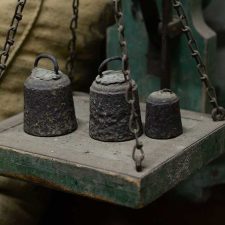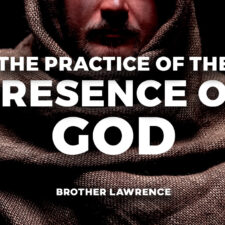“For this reason it is by faith, in order that it may be in accordance with grace, so that the promise will be guaranteed to all the descendants, not only to those who are of the Law, but also to those who are of the faith of Abraham, who is the father of us all, (as it is written, “A FATHER OF MANY NATIONS HAVE I MADE YOU”) in the presence of Him whom he believed, even God, who gives life to the dead and calls into being that which does not exist. In hope against hope he believed, so that he might become a father of many nations according to that which had been spoken, “SO SHALL YOUR DESCENDANTS BE.” Without becoming weak in faith, he contemplated his own body, now as good as dead since he was about a hundred years old, and the deadness of Sarah’s womb; yet, with respect to the promise of God, he did not waver in unbelief but grew strong in faith, giving glory to God, and being fully assured that what God had promised, He was able also to perform. Therefore, IT WAS ALSO CREDITED TO HIM AS RIGHTEOUSNESS.” (Romans 4:16-22)
It is no surprise that Abraham is the father of the faith and, therefore, the father of us all as believers in Christ (verse 16). How can anyone measure the degree and/or quality of faith in God it took him to “Go forth from your country, and from your relatives and from your father’s house, to the land which I will show you” (Genesis 12:1). And this of a man whose entire religious experience to that time had been the worship of pagan gods. In spite of his willingness to step out in faith, it took many trials and tests of faith to bring him to the place where he could be fully assured that God could fulfill His promises. As Paul teaches in Romans 4, the avenue to be credited with God’s righteousness is a willingness to trust God in extreme situations and to believe the most unbelievable promises.
El Shaddai
Paul begins this passage by saying that it must start with faith so that it can “be in accordance with grace” and makes the promises “guaranteed to all descendants.” This kind of faith can believe in something that does not yet exist! It does not waver because it recognizes its total dependence on God doing it. In verse 20, Paul says Abraham did not waver in unbelief (concerning God’s promises) but grew strong in his faith in what God had promised. It was always about His promises. In Genesis 17:1-8, God Almighty (El Shaddai) spoke to Abram as a ninety-nine-year-old and told him to “walk before Me and be blameless”. Abram’s response was to fall on his face, and this is when God told Abram that His covenant was with Abram, and He was now changing Abram’s name to Abraham. God was telling Abraham things that could not be believed unless El Shaddai would do it. Faith places its complete confidence in the One who would fulfill it.
Since the new covenant is with each believer individually, it assures each one with the same confidence as Abraham had once the believer exercises his faith. Future generations would also enjoy being fully assured as Hebrews 11:13-16 tells us: “All these died in faith, without receiving the promises, but having seen them and having welcomed them from a distance and having confessed that they were strangers and exiles on the earth. For those who say such things make it clear that they are seeking a country of their own. And indeed, if they had been thinking of that country from which they went out, they would have had the opportunity to return. But as it is, they desire a better country, that is, a heavenly one. Therefore, God is not ashamed to be called their God; for He has prepared a city for them.” Real faith happens when each believer recognizes he is a stranger and an exile on the earth, never getting too attached to the material world.
Anchor of the Soul
For when God made the promise to Abraham, since He could swear by no one greater, He swore by Himself, saying, “I WILL SURELY BLESS YOU, AND I WILL SURELY MULTIPLY YOU.” And so, having patiently waited, he obtained the promise. For men swear by one greater than themselves, and with them, an oath given as confirmation is an end of every dispute. In the same way, God, desiring even more to show to the heirs of the promise the unchangeableness of His purpose, interposed with an oath so that by two unchangeable things in which it is impossible for God to lie, we who have taken refuge would have strong encouragement to take hold of the hope set before us. This hope we have as an anchor of the soul, a hope both sure and steadfast and one which enters within the veil, where Jesus has entered as a forerunner for us, having become a high priest forever, according to the order of Melchizedek. (Hebrews 6:13-20)
The foundation for full assurance, complete confidence is the unchangeableness of God (He cannot lie) and His purpose, represented by His promises and His oath. The promises made to Abraham had substance, equipping Abraham to patiently wait, accompanied by His oath, the reinforcement of a person’s word by calling on God as witness to the truth. These become an anchor for the soul, so we are more than willing to change our desired course for His unchangeable purpose that always leads us to triumph in Christ (2 Corinthians 2:14). Consider the following:
The Lighthouse
I once heard a story about a battleship at sea. The ship had come under severe weather, and the captain got a report that there was light up ahead. “Is it steady or moving?” the captain called out. The lookout replied, “Steady, captain.” This meant that the ship was on a collision course. The captain sent out a message to the vessel up ahead warning, “We are on a collision course; advice you change course 20 degrees.” But the reply that came back said, “Advisable for you to change course 20 degrees.” The captain was furious and retorted, “I’m a battleship! You change course 20 degrees.” The reply flashed back, “I’m a lighthouse.”
The unchangeableness of God is our lighthouse, our hope and it brings the believer “within the veil” where the presence of God is found and where Jesus, like Abraham, has become our forerunner in the faith. This kind of hope or confident expectation is the source for our salvation, as in Romans 8:24-25, “For in hope we have been saved, but hope that is seen is not hope; for who hopes for what he already sees? But if we hope for what we do not see, with perseverance, we wait eagerly for it.” Like the lighthouse seen from a distance, we wait eagerly for the promises of God to be fulfilled and for the ultimate conclusion of all things. Within the veil of the new covenant, there is great security.













